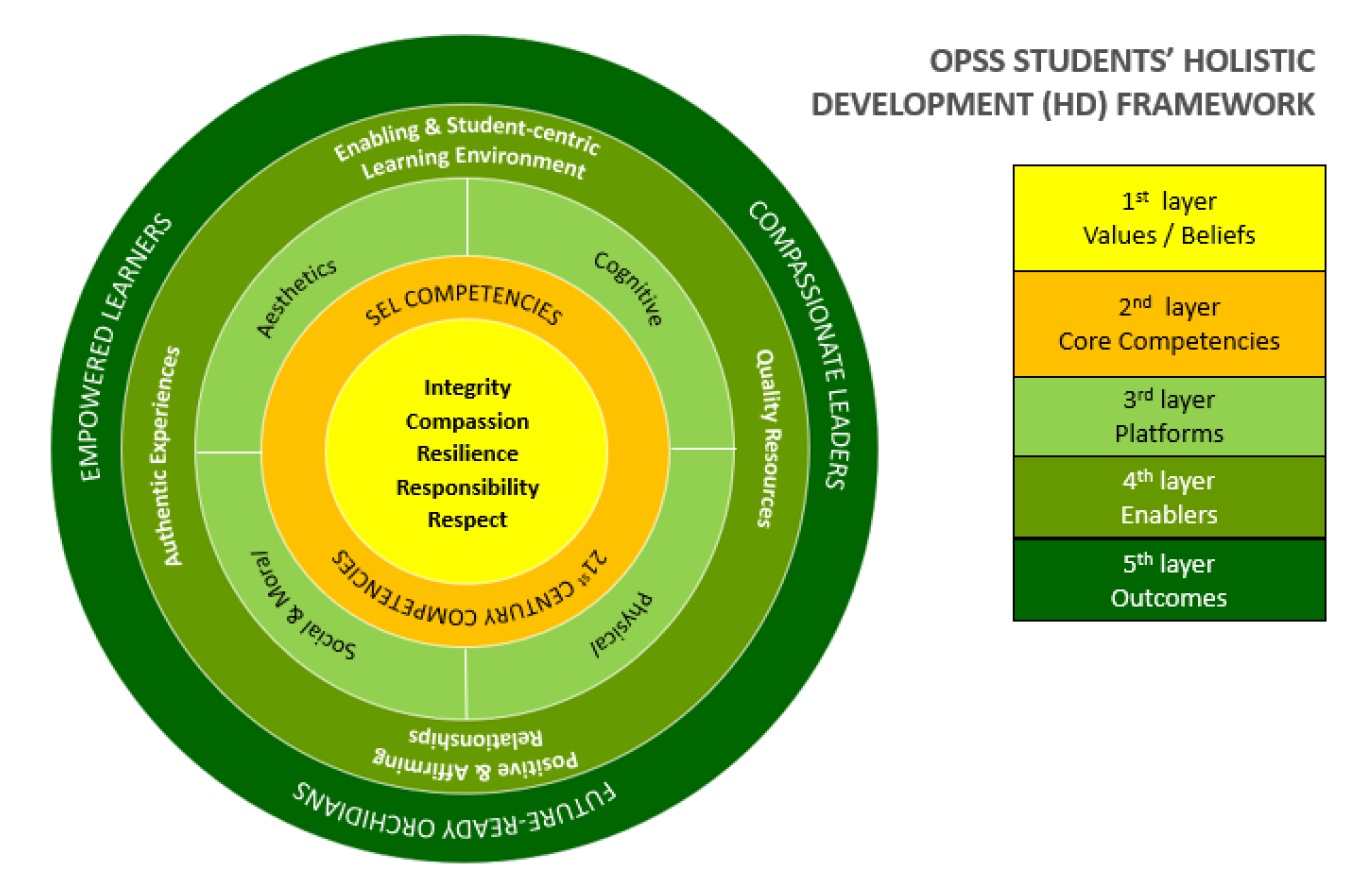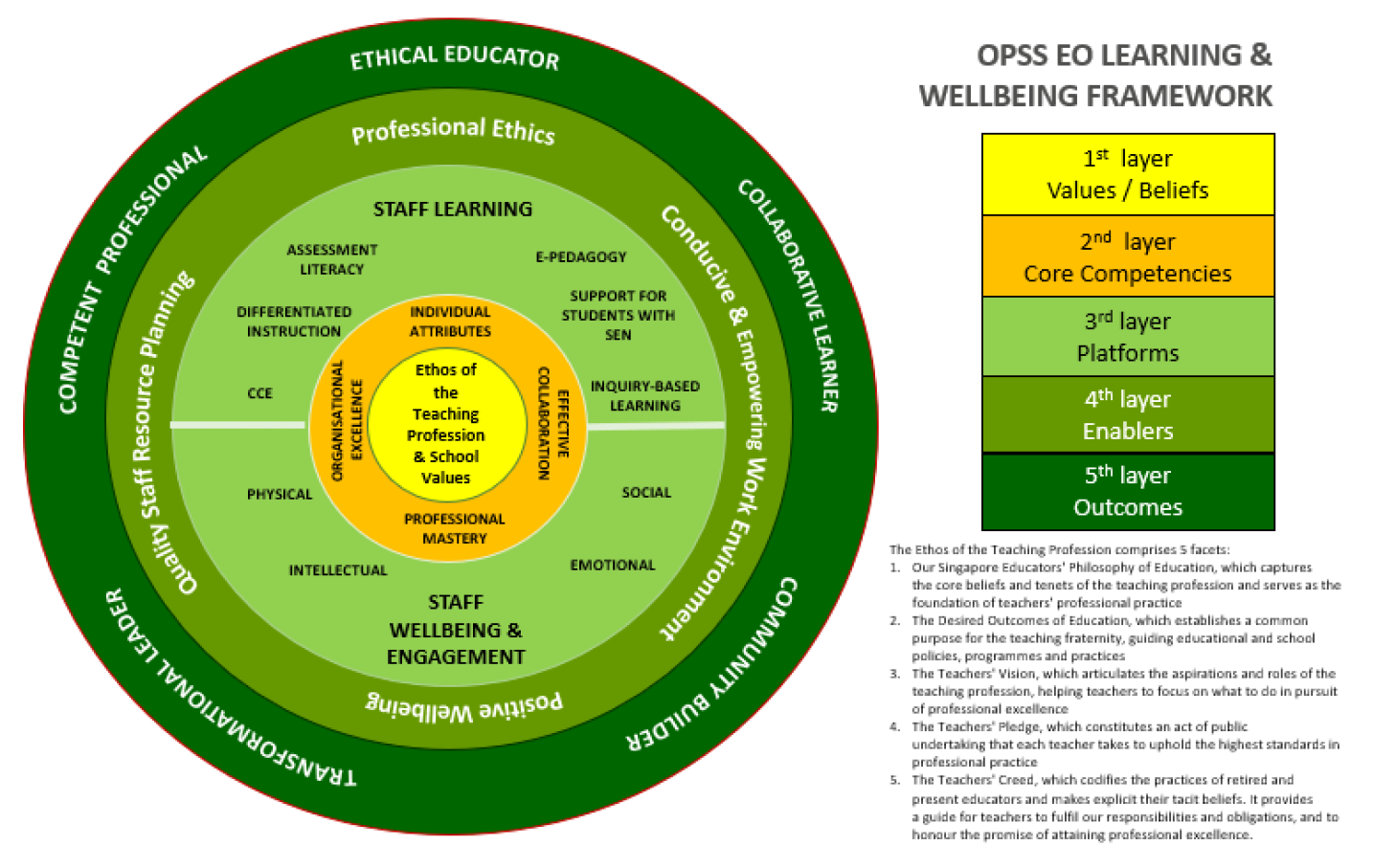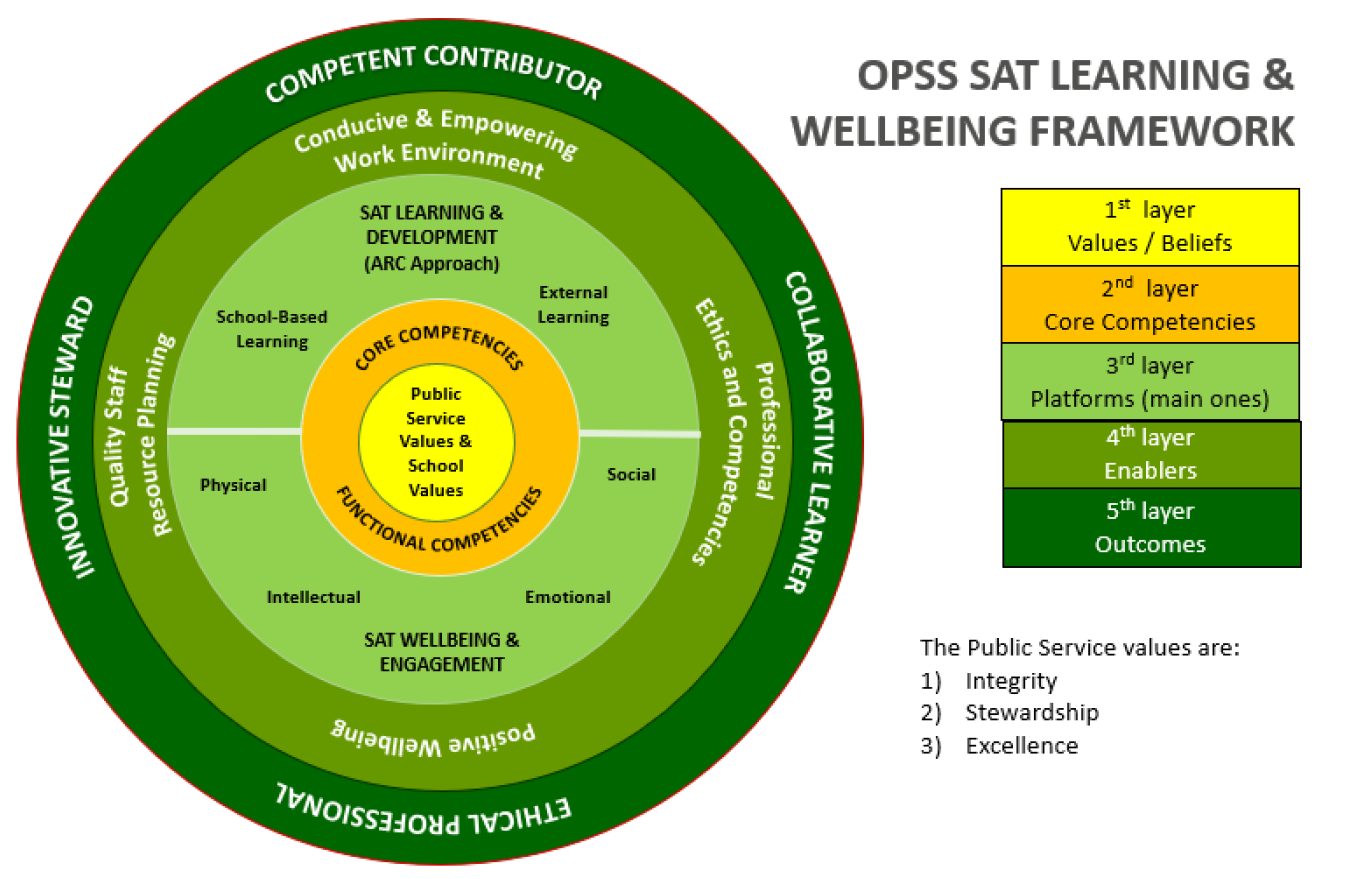Our Guiding Frameworks
Students' Holistic Development Framework

Anchored on the OPSS school values, the OPSS Students’ Holistic Development (HD) Framework encapsulates the school’s approach towards holistic development that is cognizant of larger global trends and MOE directives as well as reflective of the school’s unique context and student profile.
The immediate ring beyond the school values comprises the Social and Emotional Learning (SEL) competencies and the 21st-Century Competencies (21CC). Guided by the school values, students understand, acquire and apply these SEL competencies and 21CC within the school context, and grow their capacity to apply them to real-world contexts and challenges that will prepare them well for life and work.
These SEL competencies and 21CC are critical in developing all students in the 4 key domains of holistic student outcomes listed in the next ring: cognitive, physical, aesthetics and social-moral. These domains are also spelt out in the School Excellence Model (SEM). The plethora of OPSS platforms created to support these 4 domains ensures that the school’s efforts reach out to all student segments, catering to their needs, abilities and interests. These platforms also ensure customisation for different student tiers to enable quality learning and positive school experiences.
The penultimate ring of the framework spells out the enablers that will leverage the platforms and enable the attainment of the student outcomes spelt out in the school vision, the outermost ring of the framework. The OPSS learning environment is one where students are empowered to make informed and responsible decisions pertaining to their student life, and they participate in authentic learning experiences that reinforce positive behaviours. Many of these learning experiences are also collaborative in nature, enabling them to develop and deepen positive and affirming relationships with their peers and teachers. Finally, with the quality resources provided by the school, whether in the area of finance, administration or infrastructure, students are well supported to become future-ready Orchidians.
Staff Learning & Wellbeing Framework (EOs)

The Staff Learning and Wellbeing (SLW) Framework for EOs captures the school’s approach towards teachers’ professional development and wellbeing that is cognizant of both larger MOE directives as well as the intended staff outcomes unique to OPSS staff culture and context.
The Ethos of the Teaching Profession and our OPSS school values serve as a compass for the teaching staff. In OPSS, we believe that every child wants to and can learn, and aim to provide the learning environments and experiences that deliver the Desire Outcomes of Education.
The next ring focuses on the clusters of competencies that will enable teachers to support their students to achieve the school vision, as well as to remain engaged in their profession. These competencies encapsulate all professional facets that teachers need to acquire and hone in order to design and deliver quality lessons, build quality relationships and support all student segments. This will then translate to the desired student, professional and organisational outcomes that all teachers aspire to fulfil.
The available OPSS platforms that cater to staff learning and wellbeing are listed in the next ring. In the area of staff training, the corresponding platforms aim to upskill teachers in the areas of practice highlighted by the SkillsFuture for Educators (SFEd) professional development roadmap, as well as areas that are specific to their subjects, appointments or job scope. In the area of staff wellbeing, the platforms look into the physical, intellectual, emotional and social (PIES) needs of our teachers, so as to engage them meaningfully and purposefully in their work. Some of these platforms cater to the masses while others are customised to support identified staff members. This ensures that adequate support is given to all teachers regardless of their years in service, and also enables opportunities for the more able teachers to be stretched and developed along the teaching and leadership tracks.
To achieve the outcomes for staff learning and wellbeing highlighted in the outermost ring, the penultimate ring spells out the enablers that will leverage the platforms and enable the attainment of these outcomes. A conducive and empowering work environment enables teachers to take charge of their own learning and apply innovative ideas gleaned from their training, while quality staff resource planning enables systematic training and optimum deployment that will lead to the realisation of both short-term and long-term school goals, succession planning as well as teachers’ career aspirations. At the same time, positive staff wellbeing will ensure teachers remain motivated and engaged in improving their craft. With professional ethics as the moral compass, the OPSS Staff Learning & Wellbeing framework will enable teachers to realise the 5 outcomes envisaged in the Teachers’ Growth Model.
Staff Learning & Wellbeing Framework (SAT)

The Staff Learning and Wellbeing (SLW) Framework for SAT captures the school’s approach towards SAT’s professional learning and wellbeing that is cognizant of both the larger MOE directives as well as the intended staff outcomes unique to OPSS staff culture and context.
The Public Service (PS) values of Integrity, Stewardship and Excellence, and our OPSS school values serve as a compass for the SAT staff. These values are the tenets that guide the SAT as their work complement the EO staff support in providing learning environments and experiences that deliver the Desired Outcomes of Education for students.
The next ring focuses on the Core and Functional Competencies, based on Civil Service’s Competency-Driven Growth (CDG) to support individual and school needs, and SAT staff to remain engaged in their profession. These competencies encapsulate all professional facets that guide the critical behaviours expected of all SAT staff and delineate the functional skills and knowledge they need to possess to perform their roles effectively and efficaciously.
The available OPSS platforms that cater to SAT learning and development, and wellbeing are captured in the next ring. SAT learning and development, which adopts the ARC framework, is largely facilitated through school-based learning and external platforms. In the area of staff wellbeing and engagement, the platforms support the physical, intellectual, emotional and social (PIES) needs of SAT staff, so that they can continue to be meaningfully and purposefully engaged in their work. Some of these platforms cater to the masses while others are customised to support segmented staff members. This ensures that adequate support is given to all SAT staff regardless of their years in service, and also enables opportunities for the more-able staff to be stretched and developed in their areas of work.
The penultimate ring of the framework spells out the enablers that leverage the platforms to enable the attainment of the 4 SAT outcomes (the outermost ring). These outcomes, namely Competent Contributor, Ethical Professional, Collaborative Learner and Innovative Steward, are aligned to the school’s strategic thrust for staff - Competent, Engaged and Empowered Staff. They also capture the essence of engagement of the Head, Heart, Hands and Legs in the SAT Competency Framework. The OPSS work environment, enhanced by quality resource planning, is one where SAT staff are developed and empowered to achieve effective performance. As professionals with a positive sense of wellbeing, they are equipped to work with stakeholders to co-create solutions, effectively transform the workplace and work culture, and build new workforce capabilities.

